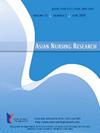Efficacy of Mind-body Exercise to Reduce Sleep Disturbance and Depression Among Older Adults: A Systematic Review and Meta-analysis
IF 2.1
3区 医学
Q2 NURSING
引用次数: 0
Abstract
Purpose
Mind-body exercise is a promising non-pharmacological approach for managing sleep disturbance and depression that are prevalent among older adults, but its efficacy remains inconclusive across the studies. This study aimed to systematically evaluate and quantify the overall effectiveness of mind-body exercises on sleep disturbance and depression in older adults.
Methods
We searched eight databases to identify relevant articles from their inception to April 2024. Experimental studies that evaluate the effects of mind-body movement therapy on sleep disturbance and depression in older adults were included. The Cochrane Risk of Bias tool version 2.0 was used to appraise included studies. The pairwise meta-analysis was performed through the software Comprehensive Meta-Analysis Version 3.0. Moreover, subgroup analysis was utilized to understand the effect size on each form of mind-body exercise and to determine the source of heterogeneity.
Results
A total of 27 studies were eligible and synthesized. The mind-body exercise appears statistically significant in reducing sleep disturbance (SMD = −0.60, 95% CI: 0.76 ∼ 0.44) and depression (SMD = −0.56, 95% CI: 0.75 ∼ 0.36) among older adults. Each form of mind-body exercise, including pilates, yoga, qigong, and tai-chi, effectively decreases sleep disturbance and depression, but there were no significant differences in the effects between these practices.
Conclusion
The cumulative evidence concludes that older adults who participated in mind-body exercise programs showed potential improvements in sleep disturbance and depression. This finding may serve as evidence for professionals to use this approach as a non-pharmacological approach to help older adults in the community and long-term care facilities who are having sleep disturbance and depression. More clinical trials are needed for an in-depth meta-analysis that can rank and compare the efficacy of each mind-body exercise practice.
身心锻炼对减少老年人睡眠障碍和抑郁的功效:系统回顾与荟萃分析。
目的:身心锻炼是一种很有前景的非药物疗法,可用于治疗老年人中普遍存在的睡眠障碍和抑郁症,但其疗效在各项研究中仍无定论。本研究旨在系统地评估和量化身心锻炼对老年人睡眠障碍和抑郁症的总体疗效:我们检索了八个数据库,以确定从开始到 2024 年 4 月的相关文章。方法:我们检索了 8 个数据库,找出了从 2024 年 4 月开始的相关文章,其中包括评估身心运动疗法对老年人睡眠障碍和抑郁症影响的实验研究。使用 Cochrane Risk of Bias 工具 2.0 版对纳入的研究进行评估。配对荟萃分析通过软件 Comprehensive Meta-Analysis Version 3.0 进行。此外,还利用亚组分析来了解每种身心锻炼方式的效应大小,并确定异质性的来源:共有 27 项研究符合条件并进行了综合分析。身心锻炼在减少老年人睡眠障碍(SMD= -0.60,95% CI:-0.76 至 -0.44)和抑郁(SMD= -0.56,95% CI:-0.75 至 -0.36)方面具有显著的统计学意义。包括普拉提、瑜伽、气功和太极拳在内的每一种身心锻炼方式都能有效减少睡眠障碍和抑郁,但这些锻炼方式之间的效果没有显著差异:累积的证据表明,参加身心锻炼计划的老年人在睡眠障碍和抑郁方面有可能得到改善。这一发现可作为专业人士使用这种方法的证据,作为一种非药物疗法,帮助社区和长期护理机构中出现睡眠障碍和抑郁的老年人。还需要更多的临床试验来进行深入的荟萃分析,以便对每种身心锻炼方法的功效进行排序和比较。
本文章由计算机程序翻译,如有差异,请以英文原文为准。
求助全文
约1分钟内获得全文
求助全文
来源期刊

Asian Nursing Research
NURSING-
CiteScore
4.20
自引率
4.50%
发文量
32
审稿时长
45 days
期刊介绍:
Asian Nursing Research is the official peer-reviewed research journal of the Korean Society of Nursing Science, and is devoted to publication of a wide range of research that will contribute to the body of nursing science and inform the practice of nursing, nursing education, administration, and history, on health issues relevant to nursing, and on the testing of research findings in practice.
 求助内容:
求助内容: 应助结果提醒方式:
应助结果提醒方式:


